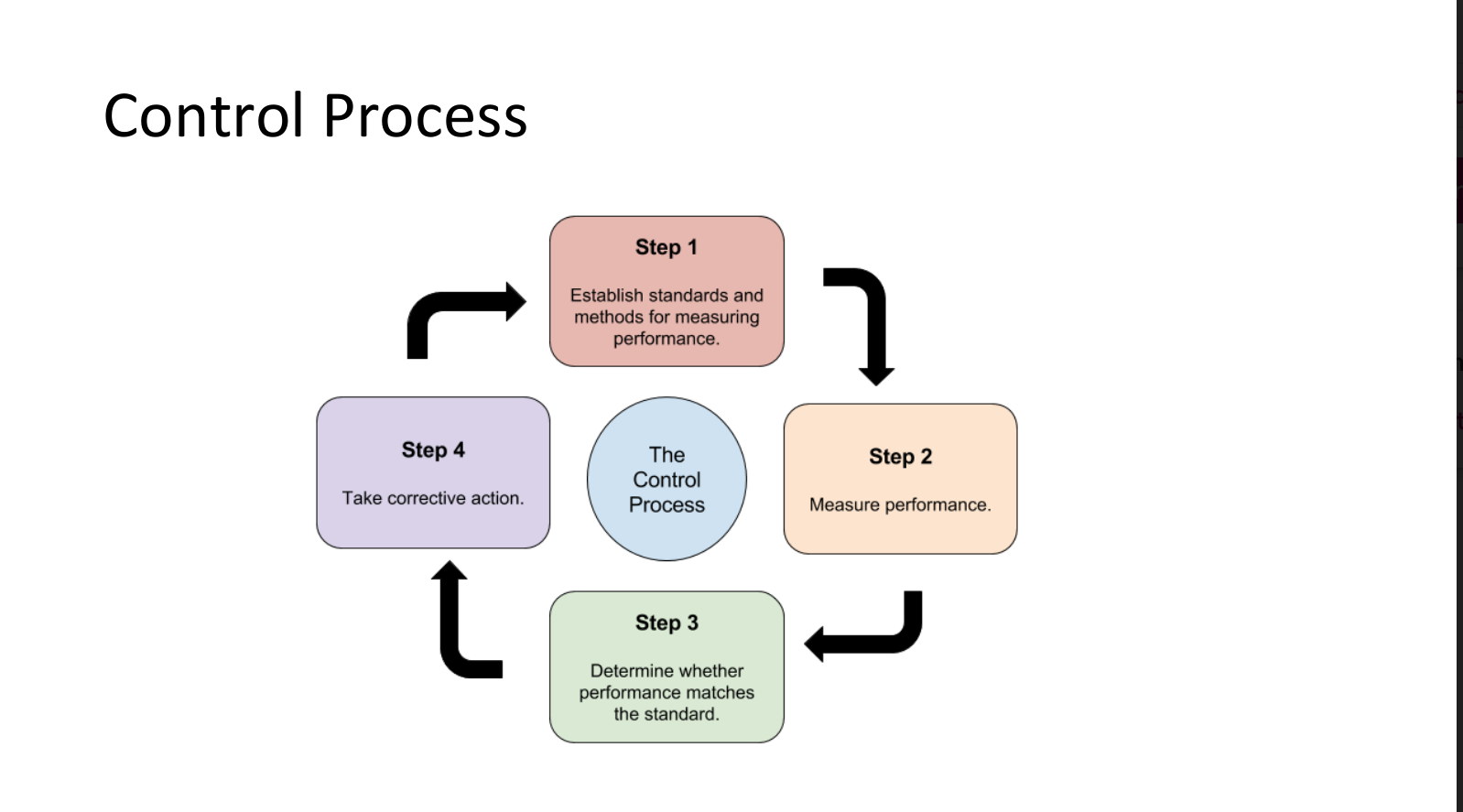Unit 4 Test
0.0(0)
0.0(0)
Card Sorting
1/26
Study Analytics
Name | Mastery | Learn | Test | Matching | Spaced |
|---|
No study sessions yet.
27 Terms
1
New cards
The Planning Process
1. Defining your objectives
2. Determine where you are in relation to your objectives
3. Anticipate future events
4. Consider alternatives and make the plan
5. Implement your plan and evaluate the results
2
New cards
Planning Benefits
* Improves focus & flexibility
* Improves action orientation - Stay ahead of competition
* Improves coordination
* Improves time management
* improves control
* Improves action orientation - Stay ahead of competition
* Improves coordination
* Improves time management
* improves control
3
New cards
Planning Tools
* Time management - scheduling
* Policies
* Operational Plans
* Budgets
* Vision Statements
* Forecasting
* Participatory Planning
* Benchmarking
* Policies
* Operational Plans
* Budgets
* Vision Statements
* Forecasting
* Participatory Planning
* Benchmarking
4
New cards
Strategic Management
a comprehensive action plan with 3 stages formulation, implementation, evaluation
5
New cards
Competitive Advantages
1. Low cost
2. Quality
3. Knowledge
4. Speed quick to market advantage
5. Barrier to entry
6. Financial position advantage
6
New cards
Why businesses fear change
* People form habits
* If it isn’t broken don’t fix it mentality
* more work
* it’s harder to take on in theory
* fear of failure
* costs money
* job security
* fear of the unknown
* internal politics
* If it isn’t broken don’t fix it mentality
* more work
* it’s harder to take on in theory
* fear of failure
* costs money
* job security
* fear of the unknown
* internal politics
7
New cards
Ways businesses can handle change
* show don’t tell
* Build innovative culture - idea walls
* Suggestion boxes
* Changing working environments - working outdoors
* Make change a constant
* Promote optimism & positivity
* Continuous training (CPD plan)
* Use employee input
* Regular feedback/evaluation
* clearly defined changes in relation to goals
* effective training
* Build innovative culture - idea walls
* Suggestion boxes
* Changing working environments - working outdoors
* Make change a constant
* Promote optimism & positivity
* Continuous training (CPD plan)
* Use employee input
* Regular feedback/evaluation
* clearly defined changes in relation to goals
* effective training
8
New cards
Strategic Planning tools
SWOT (strengths weaknesses opportunities threats) PESTLE (political, economic, social, technological, legal, environmental) SMART (specific, measurable, achievable, relevant, time bound
9
New cards
Porters 5 forces
* industry competition
* new entrants
* substitutes
* bargaining power - suppliers
* bargaining power - customers
* new entrants
* substitutes
* bargaining power - suppliers
* bargaining power - customers
10
New cards
Control process
the careful collection of information about a system, process, person, or group of people which is required to make necessary decisions about each of the departments in the process.

11
New cards
Growth Strategy
attempts to expand and increase the size of the business or organization. This might relate to growth in sales, market share, or perhaps number of physical locations. common growth strategy is the acquisition of competitors.
12
New cards
Retrenchment Strategy
a plan that attempts to fix problems - identify weaknesses and problems and effectively overcome them. This often means reducing or removing an element of the business, scaling back or becoming smaller. Ex reducing the size of your workforce, ending the production of a certain product line, or closing some retail locations.
13
New cards
Stability - status quo
is to maintain the status quo - make no major changes and keep doing what has made you successful.
14
New cards
e-Commerce - online
Retailers that are not selling online are losing business to those that are.
15
New cards
Corporate Culture
refers to the beliefs and practices associated with a particular corporation.
16
New cards
Barriers to entry
factors which prevent or deter the entry of new firms into an industry even when incumbent firms are earning excess profits.
17
New cards
Loss Leaders
a marketing strategy that prices products lower than the cost to produce them in order to attract new customers or to sell additional products to customers.
18
New cards
Benchmarking
both internal and external comparisons to help make improvements in the future. identifying best practices - the things that others do really well.
19
New cards
Forecasting
attempting to predict what the future might hold. The business perspective is in terms of projected revenues, costs, and profits.
20
New cards
Performance Appraisal
a periodic and systematic process whereby the job performance of an employee is documented and evaluated.
21
New cards
Mission Statement
a formal summary of the aims and values of a company, organization, or individual.
22
New cards
Vision Statement
a clearly defined organizational purpose and an expression of what it hopes to be in the future.
23
New cards
participatory planning
includes specific stakeholders in the planning process. The stakeholders of most interest and concern are those who will be directly affected by the plans that are put into place.
24
New cards
progressive discipline
*a practice in which management takes a series of steps to help employees improve their work performance*.
25
New cards
Internal Control
***processes and records that ensure the integrity of financial and accounting information and prevent fraud***.
26
New cards
External Control
any sort of influence from outside of an organization that affects how it operates - regulating on a company's governance policies, such as hiring policies and safety procedures
27
New cards
continuous professional development
***the ongoing process of developing and maintaining professional skills***